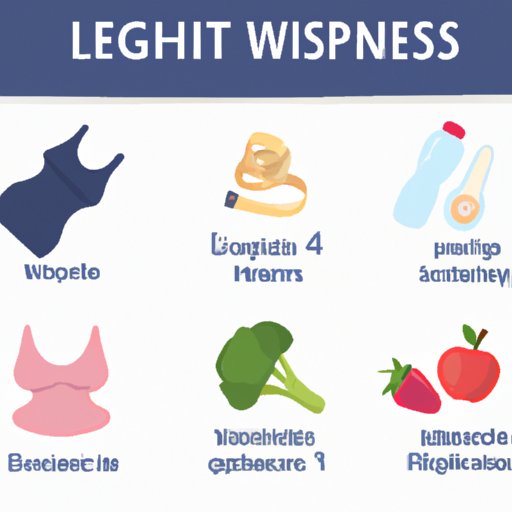
Introduction
Many new mothers struggle with the challenge of losing the weight gained during pregnancy. While it is important to shed the extra pounds for health and aesthetic reasons, it is equally important to do it safely and effectively. This article aims to provide a comprehensive guide to losing pregnancy weight that covers tips, workout plans, nutrition plans, breastfeeding advice, and mental health strategies. By adopting a holistic and sustainable approach, new mothers can regain their pre-pregnancy shape and confidence without compromising their health or well-being.
Tips to lose pregnancy weight effectively
The first step to losing pregnancy weight is to set realistic goals based on individual factors such as age, pre-pregnancy weight, physical condition, and medical history. Rapid weight loss is not advisable, as it can negatively affect milk supply, energy levels, and overall health. Instead, new mothers should aim for gradual weight loss of 1-2 pounds per week.
Exercise is crucial for postpartum weight loss, as it helps burn calories, boost metabolism, and improve mood. A balanced approach that includes cardio, strength, and flexibility exercises is recommended, as well as finding ways to add physical activity to daily routines such as walking, dancing, or swimming with the baby. Healthy food choices are also essential, with a diet rich in whole grains, fruits, vegetables, lean proteins, and healthy fats, and avoiding crash diets or overly restrictive plans.
A workout plan for postpartum weight loss
A sample workout plan can help new mothers get started and stay motivated on their weight loss journey. It should be tailored to their fitness level and preferences and include exercises that target core muscles, which are often weakened or stretched during pregnancy, as well as ones that work multiple muscle groups and increase cardiovascular fitness. A sample routine could include squats, lunges, push-ups, planks, and cardio intervals such as jumping jacks or jogging in place. It is important to start slowly and gradually increase intensity, reps, or weight over time to avoid injury or burnout.
Developing a post-pregnancy nutrition plan
A balanced and varied diet is crucial for new mothers to heal, recover, and produce milk. Skipping meals, emotional eating, or fad diets are not recommended, as they can deprive the body of essential nutrients. New mothers should focus on foods that provide iron, calcium, vitamin D, omega-3 fatty acids, and probiotics, such as leafy greens, dairy products, fish, nuts, and fermented foods. They should also practice meal planning, grocery shopping, and meal prepping to save time and money while ensuring healthy choices. It is also important to manage cravings, eat out wisely, and deal with food allergies or sensitivities in consultation with a healthcare provider.
Combining breastfeeding and weight loss
Many new mothers wonder if breastfeeding can help them lose weight faster. While there is some evidence that breastfeeding can contribute to calorie burning and appetite control, it is not a magic solution. In fact, some women may retain weight or even gain weight during breastfeeding due to the hormonal changes and the hunger and fatigue caused by the demands of infant care. To optimize milk production while losing weight, new mothers should stay hydrated, eat enough calories and protein, and avoid drastic changes in diet or exercise. They should also address any concerns related to engorgement, sore nipples, or pumping by seeking help from lactation consultants or peer support groups.
Mental health and postpartum weight loss
The postpartum period can be a challenging time for mental health, as new mothers may experience anxiety, depression, or body image issues, and struggle with lack of sleep and identity changes. It is important to prioritize self-care practices that can reduce stress, improve mood, and enhance motivation. This can include getting enough sleep, asking for help from family or friends, staying connected with loved ones, and practicing mindfulness or meditation. It is also important to seek professional support if needed, such as counseling services or medical professionals.
Conclusion
Losing pregnancy weight is a common goal for new mothers, but it should not come at the expense of their health or well-being. By adopting a balanced and sustainable approach that encompasses exercise, nutrition, breastfeeding, and mental health, new mothers can achieve their weight loss goals while also taking care of themselves and their baby. Every woman’s journey is unique, and there is no shame in seeking help or taking time to adjust to the new role of motherhood. With patience, perseverance, and support, new mothers can embrace the joy and challenges of this life-changing experience.





